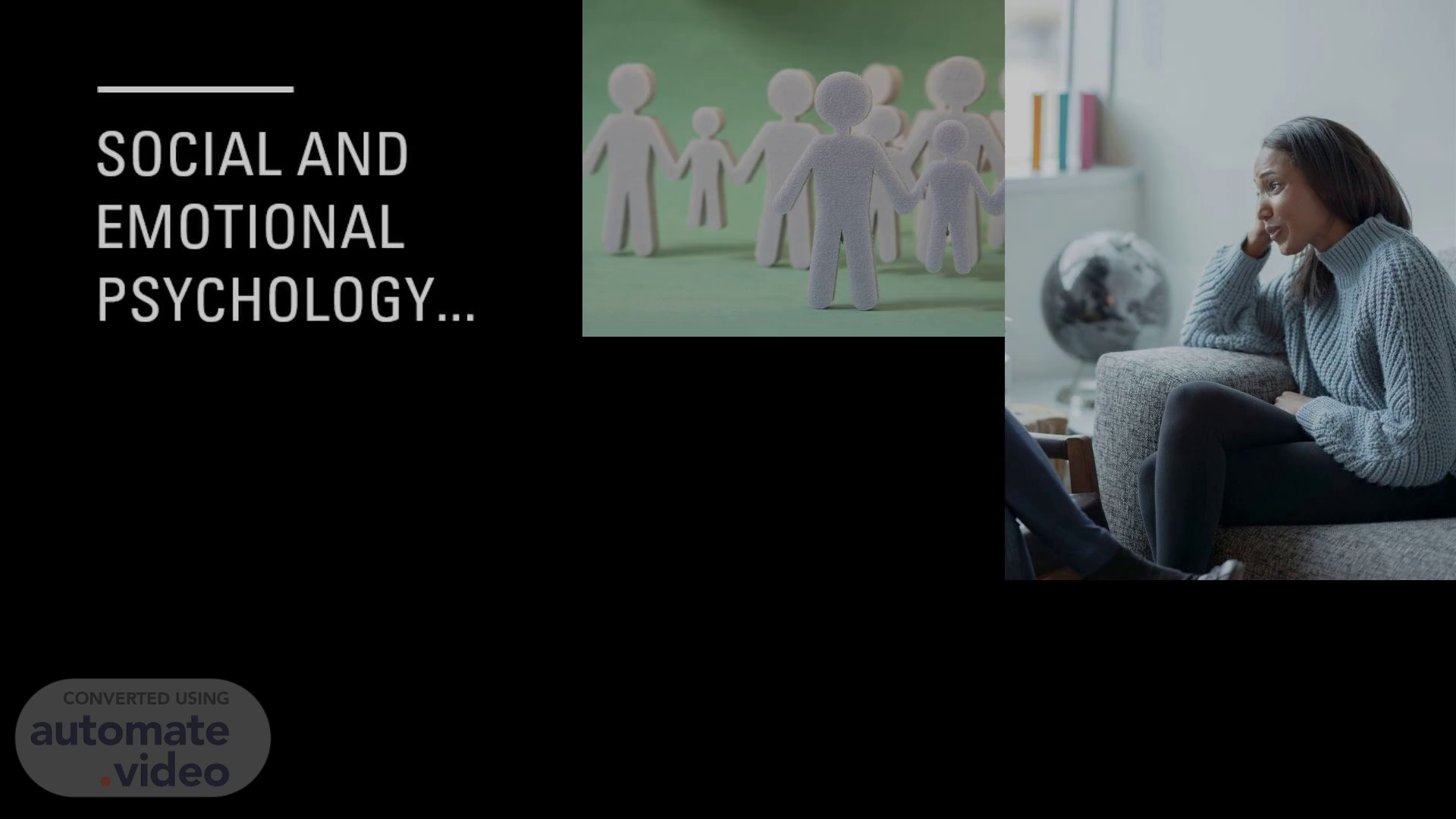Scene 1 (0s)
[Audio] Social and Emotional Psychology.... Social and Emotional Psychology....
Scene 2 (18s)
[Audio] Social and emotional psychology is an essential field that explores how people experience emotions, build relationships, and interact with the world around them. It examines how individuals understand and manage their own feelings, while also learning to recognize and respond to the emotions of others. These skills are important because they influence how people form friendships, solve problems, and make decisions..
Scene 3 (43s)
[Audio] Understanding social and emotional psychology not only helps us improve our personal well-being but also strengthens families, schools, and communities. By studying how emotions and social connections shape human behavior, we can gain valuable insight into what people need to live healthy, balanced, and meaningful lives..
Scene 4 (1m 4s)
[Audio] If social and emotional skills in children aren't developed, it can create long-lasting challenges in their lives. Children who lack these skills may struggle to understand or manage their emotions, which can lead to difficulties with anger, anxiety, or sadness. They may also find it hard to build healthy relationships, communicate effectively, or work well with others, which can affect both their school performance and friendships..
Scene 5 (1m 31s)
[Audio] As they grow older, these struggles can carry into adulthood, making it harder to handle stress, resolve conflicts, or succeed in professional settings. Without proper development, children risk feeling isolated, misunderstood, or unprepared for the demands of life, which is why social and emotional growth is such an important part of childhood development..
Scene 6 (1m 54s)
[Audio] Social and emotional developmental child psychology should be a standard part of the American school curriculum, as greater emphasis on nurturing children's social and emotional growth would provide them with essential skills to carry into adulthood. We need to understand the minds of children in order to help them grow, recognize their feelings, and learn healthy ways to deal with them..
Scene 7 (2m 16s)
[Audio] Current child psychology shows: Nearly 1 in 5 children ages 3 to 17 (21%) had been diagnosed with a mental, emotional, or behavioral health condition (2021) 11% of children ages 3-17 had current, diagnosed anxiety (9% of males and 12% of females). 8% of children ages 3-17 had current, diagnosed behavior disorders (10% of males and 5% of females) 4% of children ages 3-17 had current, diagnosed depression (3% of males and 6% of females)..
Scene 8 (3m 1s)
[Audio] An 11-year-old boy, Jake, was referred to an inpatient unit of the Children's Hospital for further diagnostic evaluation and treatment by the pediatric liaison team on call. He was socially isolated at school and in the rural community where he lived. He had behavioral difficulties at home and difficulties in adhering to the boundaries set by the parents. His mother labeled him as a "troublemaker" and he was oppositional at school with inappropriate behavior. He was frequently interfering with teaching in the classroom. Although he wanted to socialize with other children, he was clumsy and aggressive in his attempts to initiate contact. Teachers and other children's parent's complaints objectified the presence of behavioral problems. His behavior was described as aggressive and violent. His play and his reactions were often inappropriate and fear-provoking to others—i.e., he performed animal amputations, made and collected poisons, destroyed objects, and set fires. Jake was born at full term and was described as a quiet baby. In the first three months of his life, his mother became worried as he was unresponsive to cuddles and hugs. He also never cried. He has no friends and, on occasions, he has been victimized by bullying at school and in the community. His father is 44 years old and describes having had a difficult childhood; he is characterized by the family as indifferent to the children's problems and verbally violent towards his wife and son, but less so to his daughters. The mother is 41 years old, and describes herself as having a close relationship with her children and mentioned that she usually covers up for Jake's difficulties and makes excuses for his violent outbursts.[1].
Scene 9 (4m 51s)
[Audio] Reflecting on the importance of social and emotional development, it's clear that children need more than just academic knowledge to succeed—they need emotional intelligence, self-awareness, and healthy coping skills. When we integrate developmental psychology into the American school curriculum, we give students the foundation to understand themselves and others better. Teaching empathy, communication, and emotional regulation prepares children not only for school but for life. In conclusion, prioritizing social and emotional developmental psychology is essential for building a stronger and more compassionate society. Our children are the future, and by nurturing their emotional well-being today, we help create capable, understanding, and resilient adults who can lead with empathy and wisdom tomorrow..
Scene 10 (5m 45s)
Reference List:. Centers for Disease Control and Prevention. (2025, June 5). Data and statistics on children’s mental health. U.S. Department of Health & Human Services. Retrieved September __, 2025, from https://www.cdc.gov/children-mental-health/data-research/index.html CDC Hicks, C. (2025, January 31). Case studies: Disorders of childhood and adolescence. Lumen Learning. https://courses.lumenlearning.com/wm-abnormalpsych/chapter/case-studies-disorders-of-childhood-and-adolescence/ The Baker Center for Children and Families. (2025,May 10.) Children’s Mental Health Awareness Week. https://www.bakercenter.org/cmhaw.
Scene 11 (6m 18s)
[Audio] As a child, I faced many challenges that neither my parents nor I understood because our home lacked knowledge about emotional and developmental skills. This lack of understanding caused emotional trauma to be passed down through generations. Many people repeat their parents' behaviors without realizing they are continuing cycles of unhealed trauma. In today's world, balancing work, school, and parenting makes it hard to focus on mental health, which is why social and emotional psychology should be taught in schools. I had my son at 16 and my daughter at 17, and even though I was scared, I took parenting classes to break my family's cycle and give my children a healthier start..
